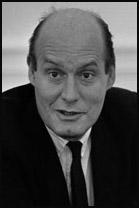Nicholas Katzenbach

Nicholas Katzenbach was born in in Philadelphia, Pennsylvania, on 17th January, 1922. After graduating from Phillips Exeter Academy he joined the United States Army Air Force (USAAF). During the Second World War he was captured by enemy troops and spent two years as a prisoner of war in Italy.
After the war Katzenbach attended Princeton University and Yale Law School. While at Yale he was editor-in-chief of the Yale Law Journal. Katzenbach also received a Rhodes scholarship and studied at Oxford University for two years. In 1950 he became a lawyer in New Jersey.
In 1952 Katzenbach became Associate Professor of Law at Yale University. He was also Professor of Law at the University of Chicago (1956-1960). He was also the co-author of The Political Foundations of International Law (1961).
Katzenbach joined the justice department's Office of Legal Counsel and in April 1962, was promoted to deputy attorney general, the second highest position in the department. Katzenbach worked closely with President John F. Kennedy and was given the task of securing the release of prisoners captured during the Bay of Pigs raid on Cuba.
A supporter of civil rights Katzenbach oversaw departmental operations in desegregating the University of Mississippi in September 1962 and the University of Alabama in June 1963. He also worked with Congress to ensure the passage of the 1964 Civil Rights Act.
On the advice of Robert Kennedy President Lyndon B. Johnson appointed Katzenbach as Attorney General of the United States. In this post he helped draft the Voting Rights Act. Katzenbach clashed with J. Edgar Hoover over his policy of ordering unauthorized wiretaps of people such as Martin Luther King. Katzenbach resigned in 1966, stating "he could no longer effectively serve as attorney general because of Mr. Hoover's obvious resentment of me."
President Johnson then appointed him Under Secretary of State on 21st September, 1966. Johnson also appointed Katzenbach to a three-member commission charged with reviewing Central Intelligence Agency activities. After Johnson resigned Katzenbach returned to private law practice in Princeton, New Jersey.
Primary Sources
(1) Nicholas Katzenbach, memorandum for Bill Moyers (25th November, 1963)
It is important that all of the facts surrounding President Kennedy's Assassination be made public in a way which will satisfy people in the United States and abroad that all the facts have been told and that a statement to this effect be made now.
1. The public must be satisfied that Oswald was the assassin; that he did not have confederates who are still at large; and that the evidence was such that he would have been convicted at trial.
2. Speculation about Oswald's motivation ought to be cut off, and we should have some basis for rebutting thought that this was a Communist conspiracy or (as the Iron Curtain press is saying) a right-wing conspiracy to blame it on the Communists. Unfortunately the facts on Oswald seem about too pat - too obvious (Marxist, Cuba, Russian wife, etc.). The Dallas police have put out statements on the Communist conspiracy theory, and it was they who were in charge when he was shot and thus silenced.
3. The matter has been handled thus far with neither dignity nor conviction. Facts have been mixed with rumour and speculation. We can scarcely let the world see us totally in the image of the Dallas police when our President is murdered.
I think this objective may be satisfied by making public as soon as possible a complete and thorough FBI report on Oswald and the assassination. This may run into the difficulty of pointing to in- consistencies between this report and statements by Dallas police officials. But the reputation of the Bureau is such that it may do the whole job. The only other step would be the appointment of a Presidential Commission of unimpeachable personnel to review and examine the evidence and announce its conclusions. This has both advantages and disadvantages. It think it can await publication of the FBI report and public reaction to it here and abroad.
I think, however, that a statement that all the facts will be made public property in an orderly and responsible way should be made now. We need something to head off public speculation or Congressional hearings of the wrong sort.

